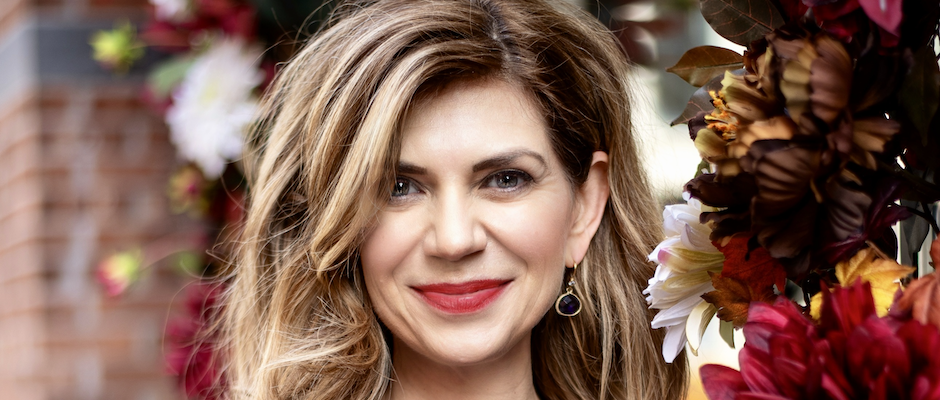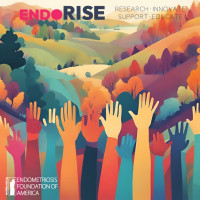
Georgie Kovacs had just returned from her honeymoon in 2010 when she happened to have her annual OB-GYN appointment. A few days later, her doctor, who had routinely drawn blood, called Georgie to suggest seeing a fertility doctor. This surprised Georgie—she was thirty-five years old at the time, and had never thought she was infertile. Her grandmother had fourteen kids and no one in her family ever struggled with infertility. Despite this family history, Georgie proceeded to spend the next four years struggling to get pregnant, despite seeing the best doctors. She also struggled to get the answers behind the cause for her infertility.
Three and a half years into her infertility journey, Georgie had had immunological tests done when her doctor told her that she may have endometriosis. Despite a background in healthcare, she had never heard about the disease. And, she was otherwise asymptomatic.
As the doctor informed her, the only way to know for sure whether she has endometriosis was to have laparoscopic surgery. Georgie weighed the costs: it was $15,000 for another round of IVF or $5,000 for a surgery. She’d tried IVF treatment many times without success, and she figured the laparoscopic surgery would not only be less expensive, but also, hopefully, would provide the answer she was looking for.
A few months later, Georgie was diagnosed with endo. After her first IVF treatment following her endo surgery, she succeeded in getting pregnant. Georgie explains that the two happiest days of her life were finding out she was pregnant then having her son. The third was being given a diagnosis. “I was walking around with a diagnosis of unexplained infertility,” she explains. “I remember saying to myself, no, it's not unexplained. There is a reason why I'm not getting pregnant.”
Throughout this four-year journey, Georgie began to learn that her personal struggle with infertility was a small piece in a bigger puzzle, and a much bigger women’s health problem. Women are consistently dismissed, and there aren’t proper answers for the symptoms they experience. The root of the problem? Georgie suggests a few. One, there isn’t enough funding for clinical trials for women. And when there are clinical trials, women are often not a part of them. The second cause? A lack of proper training for doctors on specialties such as endometriosis.
“And when you put all of that together,” Georgie says, “it's really, really hard for women to get the right treatment.” In addition, Georgie notes that women aren’t taught enough about their bodies, which makes it difficult to receive the answers for the treatment they seek.
Driven to implement change and spread accurate medical information to and for women, Georgie founded Fempower Health, which provides women with the information that they should know, but often take a long time to find. Fempower Health’s mission is to simplify an individual’s endless search for a diagnosis and treatment. Featuring a highly informative podcast and a critical survey, Fempower Health centers the patient’s direct experience. The website also includes resources, including a list of the symptoms that one should be sharing about themselves with a doctor.
“We don't promise cures,” Georgie explains, “but we aim to empower women so that when they do the research and when they go to their doctors, they're much more knowledgeable about the situation and about themselves. Then, they can hopefully receive a diagnosis and treatment much more quickly.”
When data and stories come to life, a woman who is struggling with infertility, for example, can assess for herself what the disparities look like based on the state she resides in, what type of doctor she needs to see, and develop an informed plan of action. Fempower Health’s podcast interviews experts in all aspects of women’s reproductive health, including pelvic floor specialists, surgeons, wellness experts, and more. “I tend to like to be really direct with people and get down to the bottom of issues,” Georgie explains, “and I have a passion for problem solving and always like to get at the root cause.” These topics in women’s health are often difficult to confront, so in asking the hard questions, Georgie has been able to produce highly informative and revealing conversations that make steps in the right direction towards change in the arena of women’s health.
Most notably, Fempower Health’s survey is not your average survey; instead of relying on impersonal data that you may be able to comb out on the Internet, it centers the patient’s direct experience and allows for women to receive guidance from other women. The survey focuses on multiple disorders, including PCOS, endometriosis, and thyroid disease.
“When you look at the behavior of women,” Georgie says, “women go to other women for answers.” Given the lack of data that Georgie found in women’s health, she decided that the best solution was to create data from women’s experience to then share with other women. “Women share what worked for them and what didn't work, and that gives data for other women to figure out what they might want to try.” Even in the early survey results, Georgie noted that every single woman said that they seek out their friends for fertility doctor recommendations. When women share information with one another, they have the tools to make their own highly informed decisions. Georgie’s dream is for this survey to change the face of clinical trials and how women are treated in healthcare.
Georgie firmly believes that the medical community also needs this data, as well as further research and clinical trials, in order to properly treat the populations they serve. When Georgie attended EndoFound’s Medical Conference in 2019, she was overwhelmed by the fact that even when the most trained and competent surgeons in women’s health were brought together, they still disagreed on the best treatments for endometriosis. “It became clear that they had to train themselves in endometriosis treatment,” Georgie says, “because the disease isn’t taught enough in medical school.”
With asymptomatic endometriosis, it can be especially difficult for an individual to be diagnosed. Often, like with Georgie’s case, endometriosis isn’t suspected unless the individual tries to get pregnant. “Unfortunately,” Georgie explains, “endo, Hashimoto's, and Graves' have very similar symptoms. It's hard to tell what it is that you have.”
Georgie spent years looking for an answer for her infertility, and her mission is simple: to ensure that other women get the information they need about their health as efficiently as possible. “I felt betrayed by the medical community because I struggled for four years before being diagnosed with endometriosis—because I happen to be asymptomatic.”
In an effort to inform other women who could be struggling with asymptomatic endometriosis, Georgie recommends monitoring your body. It’s hard to know what’s normal when women are used to bearing pain.
“In short,” Georgie adds, “monitor your body and stand up for yourself at your doctor's office. And if your doctor's not listening and trying to be solution-oriented, then you have to question your doctor and whether or not this is the right person for you.”
Please visit this page to participate in Fempower Health’s survey. By sharing your story, you can help countless other people receive the treatment they deserve.
Georgie Kovacs, MBA, is the founder of Fempower Health, which she founded after her firsthand experience with infertility. Leveraging this experience along with her 20 year tenure in the biopharmaceutical industry and consulting, she leads this movement to empower women. With limited research dollars and women’s “training” to grin and bear it, both women and doctors are in the impossible position to diagnose and treat conditions with little information. Women deserve more and better information, insight and innovative health solutions. She engages and supports her community with her podcast, survey, and website.









